One technology that has gained significant traction recently is Conversational AI. In this article, we will explore what Conversational AI is, its significance in lead generation, and how it revolutionizes how businesses generate leads. So, let's dive right in!
With its ability to create interactive and personalized conversations, Conversational AI utilizes artificial intelligence technologies like natural language processing and machine learning to mimic human-like interactions.
Moreover, companies that integrated Conversational AI into their customer acquisition process experienced a 67% higher conversion rate than traditional methods.
With such promising results, businesses are leveraging the power of Conversational AI across various channels. Chatbots embedded on websites, social media platforms, and messaging apps enable instant and personalized interactions, capturing leads around the clock.
By embracing Conversational AI, businesses can unleash its power and tap into a world of limitless possibilities for growth and success.
Importance of Lead Generation
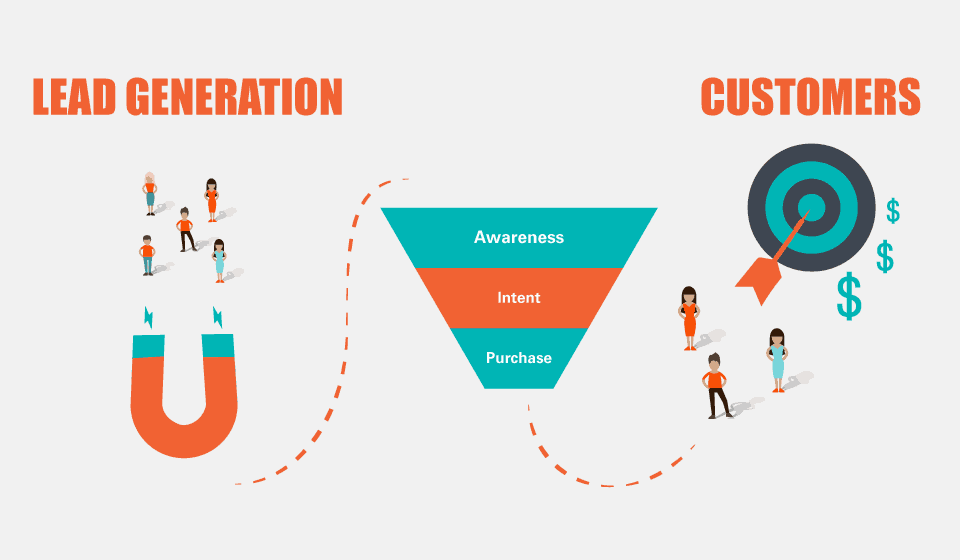
Lead generation plays a crucial role in the success of any business. It involves identifying and attracting potential customers interested in a company's products or services. Effective lead generation helps businesses expand their customer base and increase revenue and overall growth.
Conversational AI for Lead Generation
Conversational AI has emerged as a game-changer in the field of lead generation. It leverages advanced technologies to engage potential customers in meaningful conversations, gather valuable information, and convert them into qualified leads.
By providing personalized and interactive experiences, Conversational AI holds the potential to transform the way businesses interact with their prospects and generate leads.
Common Challenges of Using Conversational AI for Lead Generation
Traditional lead generation methods often need help with low conversion rates, lack of personalization, and inefficiency in capturing leads. Conversational AI addresses these challenges by offering a more engaging and tailored approach to lead generation.
It enables businesses to connect with prospects quickly, provide instant assistance, and gather valuable insights to nurture leads effectively.
What is Conversational AI?
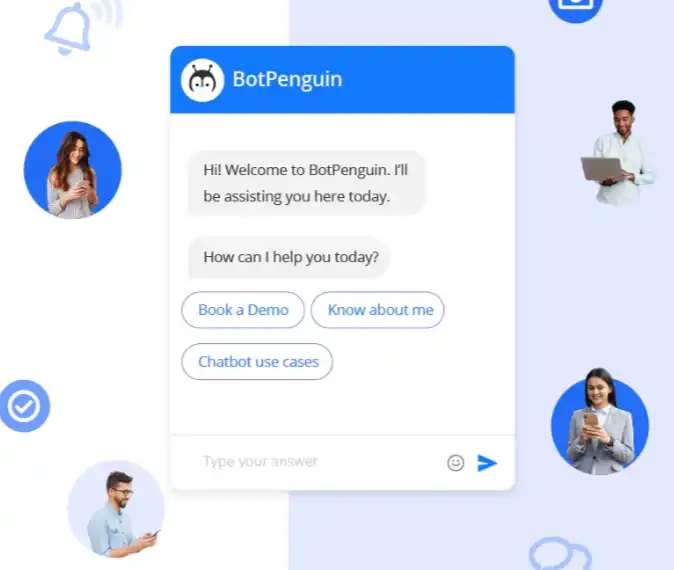
To better understand Conversational AI, let's break it down. Conversational AI is an umbrella term that encompasses various technologies and applications, including chatbots, virtual assistants, voice assistants, and messaging platforms. These technologies employ natural language understanding and processing algorithms to simulate human-like conversations with users across different channels and touchpoints.
Conversational AI systems are designed to understand user queries, context, and intent. They analyze and interpret the user's input using natural language processing techniques, allowing them to provide accurate and relevant responses.
Through continuous learning, these systems improve their understanding and become more proficient in engaging with users.
How Conversational AI Works?
Conversational AI systems rely on a combination of technologies to function effectively. They use natural language understanding to process user inputs and extract relevant information. Machine learning algorithms help these systems learn from user interactions and improve their responses.
Additionally, Conversational AI systems can be integrated with backend systems and databases to fetch real-time information and provide personalized recommendations.
Types of Conversational AI
There are different types of Conversational AI systems that businesses can leverage for lead generation:
Chatbots: Computer programs simulate human conversation through text or voice interactions. They can be deployed on websites, messaging platforms, and mobile apps, providing instant assistance and gathering user information.
Virtual Assistants: Virtual assistants, like Amazon's Alexa or Apple's Siri, are voice-enabled AI systems that respond to user commands and queries. They can assist users in tasks such as setting reminders, answering questions, or providing recommendations.
Voice Assistants: Voice assistants are AI-powered applications designed to interact with users through voice commands. These assistants can make phone calls, send messages, or play music, making them ideal for hands-free and on-the-go interactions.
Suggested Reading:
Comparing Lead Generation Bots: Which One is Right for You?
Advantages and Disadvantages of Conversational AI
Like any technology, Conversational AI has its pros and cons. Let's take a look:
Advantages
Enhanced customer experience through personalized interactions.
Improved lead qualification and conversion rates.
24/7 availability, ensuring round-the-clock engagement.
Scalability, as Conversational AI systems can handle multiple conversations simultaneously.
Data collection and analysis, providing valuable insights for lead nurturing.
Disadvantages
Lack of emotional intelligence compared to human interactions.
Refrain from understanding complex queries or language nuances.
Initial setup and development costs.
Maintenance and updates to ensure optimal performance.
Lead Generation: A Critical Aspect of Business Growth
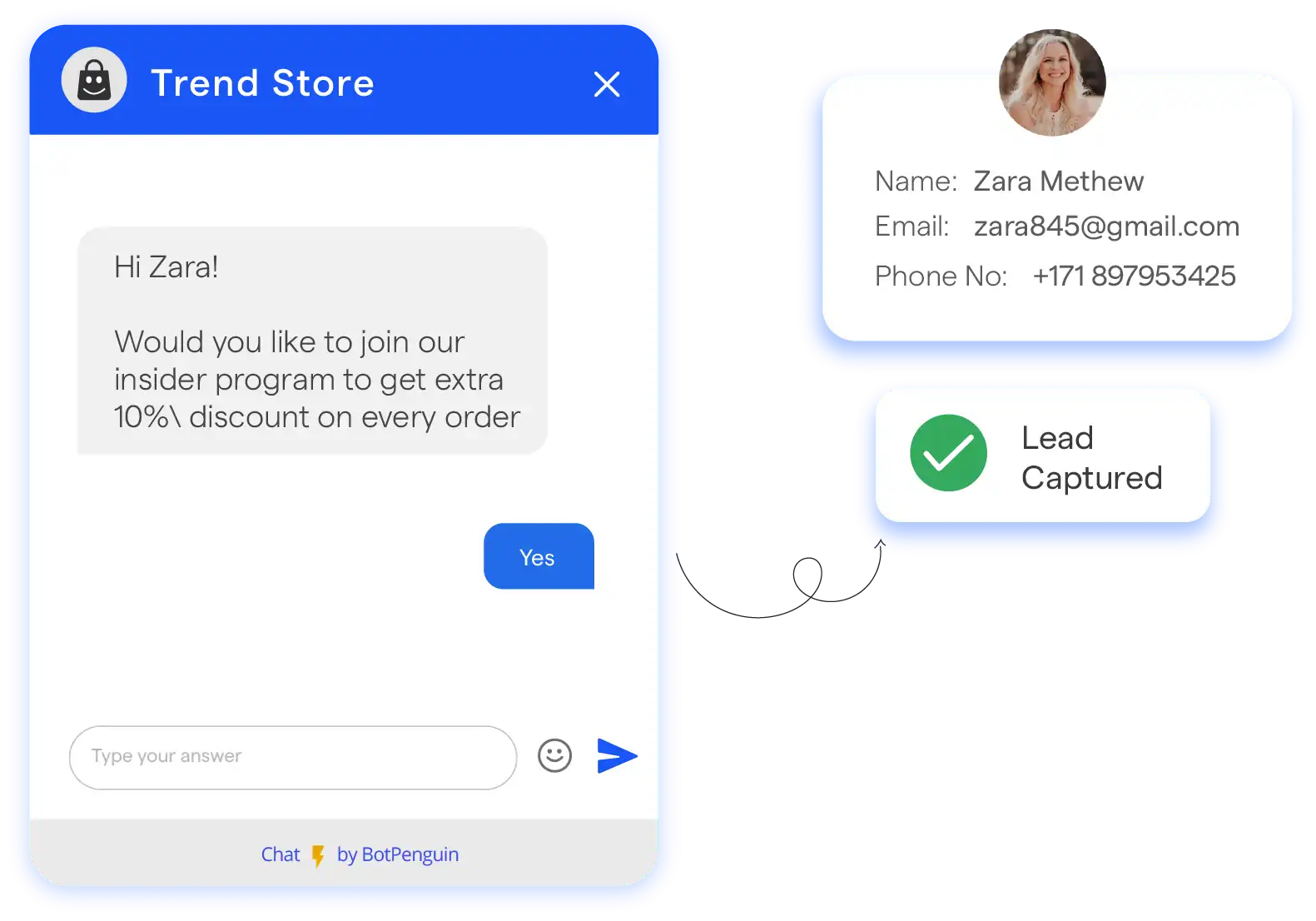
Now that we have a solid understanding of Conversational AI, let's shift our focus to lead generation. Lead generation involves identifying potential customers and capturing their interest in a company's products or services. It is an essential aspect of business growth, enabling organizations to build a pipeline of qualified prospects that can be converted into loyal customers.
Lead Generation
Lead generation is the process of attracting potential customers and collecting their information to fuel sales efforts. It involves various marketing strategies and tactics to engage prospects, gather contact information, and nurture them throughout the sales funnel.
Importance of Lead Generation for Businesses
Lead generation is immensely important for businesses, regardless of size or industry. Here's why:
Increased Sales Opportunities: Effective lead generation strategies create steady sales opportunities, allowing businesses to convert prospects into paying customers.
Targeted Marketing Efforts: By understanding the needs and preferences of potential customers, businesses can tailor their marketing efforts, ensuring maximum relevance and engagement.
Business Growth and Expansion: A robust lead generation process fuels business growth, enabling companies to expand their reach, penetrate new markets, and increase their market share.
Return on Investment (ROI): With a well-executed lead generation strategy, businesses can achieve a higher ROI by investing their resources in qualified leads more likely to convert.
Traditional Lead Generation Methods
Traditionally, businesses have relied on several methods for lead generation, including:
Cold Calling: This involves contacting potential customers via phone and pitching products or services.
Email Marketing: Businesses use email campaigns to capture and nurture leads through personalized and targeted content.
Direct Mail: Sending physical mail, such as brochures or newsletters, to prospects' addresses to create awareness and generate leads.
Events and Trade Shows: Participating in industry events and trade shows to interact with prospects face-to-face and capture their contact information.
Limitations of Traditional Lead Generation Methods
While traditional lead generation methods have been effective to some extent, they often face limitations such as:
Lack of Personalization: Mass marketing approaches fail to deliver personalized experiences, reducing the chances of capturing qualified leads.
Low Conversion Rates: Cold calling and generic email campaigns often result in low conversion rates, wasting resources and efforts.
Inefficient Lead Capture: Traditional methods need help to capture leads in real-time, missing out on potential opportunities.
Time-Consuming and Costly: Some traditional methods, such as direct mail and event participation, require significant time and financial investments.
How Conversational AI is Revolutionizing Lead Generation?
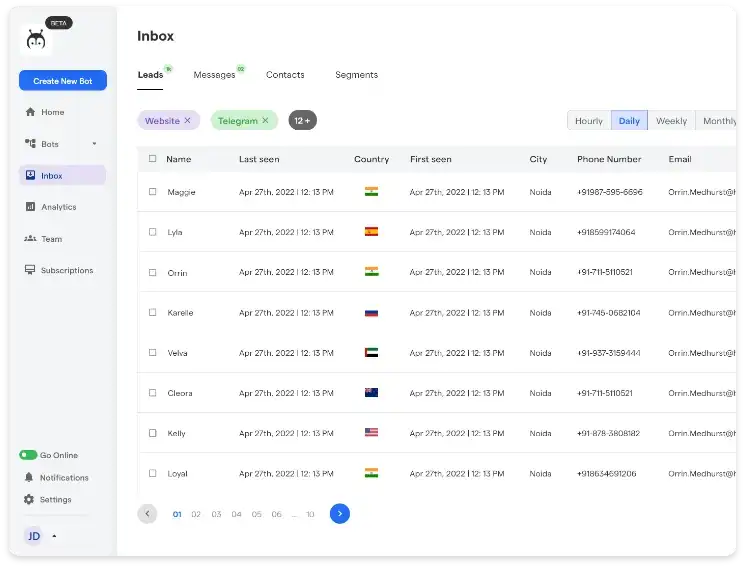
Enter Conversational AI! With its interactive and personalized capabilities, Conversational AI transforms how businesses generate leads. Let's explore how it is revolutionizing different aspects of lead generation:
Conversational AI for Website Lead Generation
By integrating chatbots or virtual assistants into websites, businesses can engage visitors in real-time conversations, capture their contact information, and provide instant assistance. Conversational AI allows for personalized interactions, guiding prospects through the sales funnel and increasing the likelihood of lead conversion.
Conversational AI for Email Lead Generation
Conversational AI-powered email campaigns can enhance lead-generation efforts by creating engaging and interactive experiences. Automated chatbots or AI-driven email responses can gather prospect information, answer questions, and provide relevant content, driving higher engagement and conversion rates.
Conversational AI for Social Media Lead Generation
Social media platforms are ideal channels for lead generation, and Conversational AI takes it to the next level. AI-powered chatbots can interact with users on social media, answer queries, and guide them toward conversion. Additionally, Conversational AI can analyze social media conversations to identify potential leads and engage with them proactively.
Conversational AI for Event Lead Generation
Conversational AI can be deployed in events and trade shows through chatbots or virtual assistants to capture leads and provide instant assistance. Attendees can engage in real-time conversations, receive personalized recommendations, and schedule follow-up meetings, streamlining the lead generation process.
And taking your first step towards lead generation chatbot isn't that tough. Meet BotPenguin- the home of chatbot solutions. With all the heavy work of chatbot development already done for you, deploy chatbots for multiple platforms:
- WhatsApp Chatbot
- Facebook Chatbot
- Wordpress Chatbot
- Telegram Chatbot
- Website Chatbot
- Squarespace Chatbot
- Woocommerce Chatbot
- Instagram Chatbot
Comparison Between Traditional Lead Generation Methods and Conversational AI for Lead Generation
Now, let's compare traditional lead generation methods with Conversational AI:
Personalization: Conversational AI offers highly personalized interactions, tailoring conversations and recommendations based on user preferences. Traditional methods often need more customization.
Real-time Engagement: Conversational AI enables businesses to engage with prospects, capturing real-time leads instantly. Traditional methods may involve delays in response and lead capture.
Scalability: Conversational AI systems can handle multiple conversations simultaneously, ensuring scalability and efficiency. Traditional methods may need help managing a high volume of leads effectively.
Cost-effectiveness: While Conversational AI requires initial setup and development costs, it can provide long-term cost savings by automating lead generation processes. Traditional methods can be more resource-intensive and expensive.
Advantages of Conversational AI for Lead Generation
Conversational AI is revolutionizing how businesses generate leads and engage with their customers. By leveraging the power of artificial intelligence and natural language processing, companies can create interactive and personalized experiences that drive customer engagement, increase conversion rates, and improve overall lead quality.
Increased Engagement and Conversion Rates

Conversational AI enables businesses to engage with their audience more interactively and conversationally. Using chatbots or virtual assistants, companies can respond instantly to customer queries, offer personalized recommendations, and guide visitors through the sales funnel.
This level of engagement leads to higher conversion rates as customers feel heard and valued.
Reduced Time and Effort
Traditional lead generation methods often involve manual tasks and time-consuming processes. Conversational AI automates these processes, saving sales and marketing teams valuable time. Chatbots can handle repetitive tasks like answering FAQs, gathering customer information, and scheduling appointments, allowing human agents to focus on more complex and strategic activities.
Improved Lead Quality
Conversational AI tools collect valuable data about customer preferences, behavior patterns, and pain points. By analyzing this information, businesses can gain deep insights into their target audience and tailor their marketing strategies accordingly. This improves lead quality, as companies can identify and prioritize high-value prospects.
Enhanced Customer Experience

Providing exceptional customer experience is a business's key differentiator. Conversational AI enables personalized interactions by understanding and adapting to individual customer needs. By delivering timely and relevant information, companies can create a seamless and enjoyable customer journey, ultimately boosting customer satisfaction and loyalty.
Increased Scalability and Efficiency
As businesses grow, managing and scaling lead-generation efforts can become challenging. Conversational AI offers a scalable solution by handling multiple conversations simultaneously without compromising the quality of interactions. Moreover, AI-powered chatbots can operate 24/7, ensuring round-the-clock support and maximizing efficiency.
Latest Trends in Conversational AI for Lead Generation
Keeping up with the latest trends in Conversational AI is essential for businesses looking to stay ahead of the competition. Some notable trends include:
Voice-Enabled Conversational AI

Voice assistants like Amazon Alexa and Google Assistant are gaining popularity, and businesses are exploring voice-enabled Conversational AI solutions. Voice interactions offer a more natural and intuitive experience, allowing customers to engage with brands using spoken commands.
Omnichannel Conversations
Customers expect seamless experiences across multiple channels, including websites, social media platforms, messaging apps, and voice assistants. Omnichannel Conversational AI enables businesses to maintain consistent and personalized interactions across all touchpoints, providing a cohesive customer experience.
Integration with CRM and Marketing Automation Systems
Integrating Conversational AI tools with customer relationship management (CRM) and marketing automation systems allows businesses to streamline lead generation processes. By syncing data between platforms, companies can automate lead scoring, nurture leads with personalized content, and track the entire customer journey.
Suggested Reading:
How Lead Generation Bots Drive Customer Engagement?
Potential Use Cases for Conversational AI for Lead Generation
Conversational AI has diverse applications across various industries. Some potential use cases include:
Real Estate: A chatbot can engage with website visitors looking for properties, gather their preferences, and schedule virtual tours, helping agents capture leads and qualify potential buyers.
E-commerce: Conversational AI can assist customers in making purchasing decisions, provide product recommendations, and offer personalized discounts, leading to increased sales and customer satisfaction.
Insurance: A chatbot can interact with potential customers, gather information about their insurance needs, provide quotes, assist with policy selection, and help insurance agencies generate qualified leads.
Automotive: Conversational AI can guide consumers through the car-buying process, answer questions about vehicle features and financing options, and schedule test drives, capturing leads for car dealerships.
Hospitality: A chatbot integrated with a hotel's website or messaging platform can handle inquiries, provide information about rooms and amenities, assist with booking, and convert website visitors into potential guests.
Challenges and Limitations of Conversational AI for Lead Generation
While Conversational AI offers numerous benefits, there are some challenges and limitations to be aware of:
Language and Cultural Understanding
Conversational AI systems may need help understanding and responding accurately to regional accents, slang, or cultural nuances, potentially leading to misinterpretations.
Complex Queries
AI-powered chatbots may need help handling complex or ambiguous queries requiring human judgment and expertise. It's important to balance automation and human intervention for optimal results.
Data Privacy and Security
Collecting and storing customer data through Conversational AI systems raises data privacy and security concerns. Businesses must comply with relevant regulations and take necessary measures to protect customer information.
Exploring Chatbot Platforms and Tools for Lead Generation
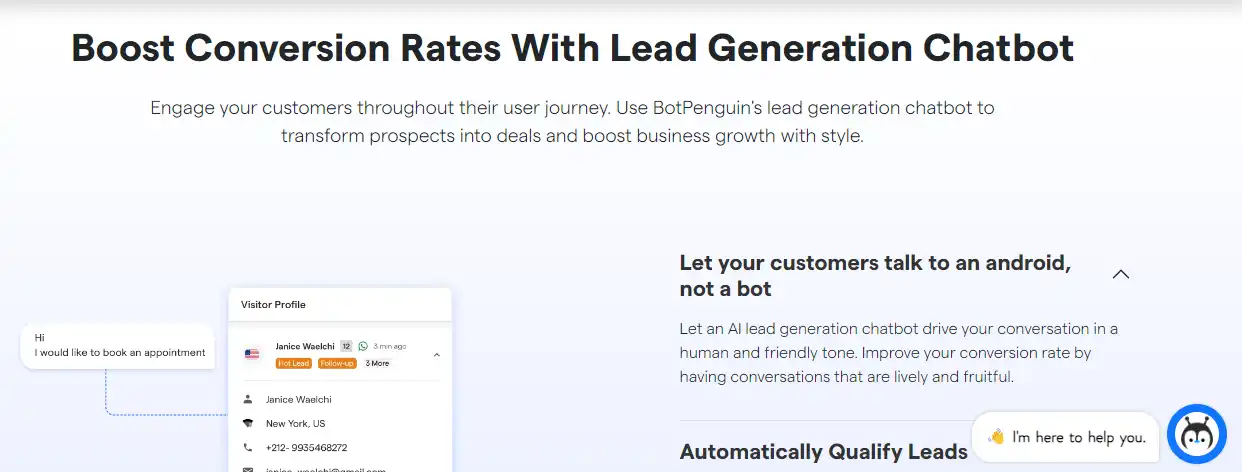
Several chatbot platforms and tools are available to simplify the implementation of lead-generation chatbots. Here are some popular options:
BotPenguin: BotPenguin is a user-friendly, AI-powered bot platform that allows businesses to create lead-generation bots without coding knowledge. Plus, you can transfer your leads to your preferred platform and nurture them.
Intercom: Intercom is a comprehensive customer messaging platform with a powerful lead generation bot.
Drift: Drift is a popular conversational marketing platform that generates qualified leads through intelligent chatbots.
Tidio: Tidio is a user-friendly chatbot platform that offers lead-generation capabilities alongside other customer communication features.
Manychat: Manychat is a popular chatbot platform primarily designed for Facebook Messenger, offering robust lead generation capabilities.
Strategies for Successful Implementation of Conversational AI for Lead Generation
To leverage Conversational AI effectively for lead generation, consider the following strategies:
Define Clear Objectives
Clearly define your lead generation goals and identify how Conversational AI can support them. This will help you determine the right use cases and measure the success of your implementation.
Design Conversations with Care
Craft conversational flows that are intuitive, personalized, and aligned with your brand voice. Ensure that the chatbot or virtual assistant understands user inputs accurately and provides helpful responses.
Continuous Optimization
Monitor and analyze conversational data to identify areas for improvement. Refine your chatbot's responses, add new intents or actions as needed, and regularly update its knowledge base to enhance performance.
Suggested Reading:
Customer Support Chatbot vs Lead Generation Chatbot: Key Points
Future Prospects of Conversational AI for Lead Generation
As technology advances and AI algorithms become more advanced, Conversational AI will continue to evolve and transform lead-generation strategies. We expect further advancements in natural language understanding, sentiment analysis, and context-aware responses.
Additionally, integrating Conversational AI with emerging technologies like augmented and virtual reality may open up new possibilities for immersive and engaging customer experiences.
Final Thoughts
Conversational AI has emerged as a game-changer in lead generation, offering businesses a powerful tool to engage with customers, drive conversions, and improve overall sales and marketing performance.
By understanding the advantages, staying informed about the latest trends, addressing challenges, and implementing effective strategies, businesses can unleash the full power of Conversational AI and stay ahead in today's competitive landscape.
So, why wait? Start exploring Conversational AI for lead generation and unlock new possibilities for your business today!
Frequently Asked Questions (FAQs)
What is Conversational AI?
Conversational AI refers to the technology that enables machines to understand and respond to human language naturally and conversationally, typically through chatbots or virtual assistants.
How does Conversational AI improve lead generation?
Conversational AI enhances lead generation by providing personalized and real-time interactions with potential customers, capturing their information, qualifying leads, and guiding them through the sales funnel more effectively.
What are some potential use cases for Conversational AI in lead generation?
Some potential use cases for Conversational AI in lead generation include chatbots on websites or social media platforms, interactive lead capture forms, personalized email or SMS campaigns, and virtual assistants for lead qualification and nurturing.
What are the challenges of implementing Conversational AI for lead generation?
Challenges of implementing Conversational AI for lead generation include ensuring the chatbot's accuracy and natural language understanding, integrating with existing systems and processes, managing privacy and data security, and providing a seamless user experience.
How can businesses implement Conversational AI successfully?
To implement Conversational AI successfully, businesses should define clear objectives, select the right platform or provider, design conversational flows that align with customer journeys, train the AI model effectively, regularly analyze and optimize performance, and prioritize a human fallback option when needed.

